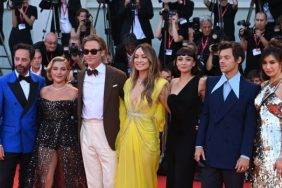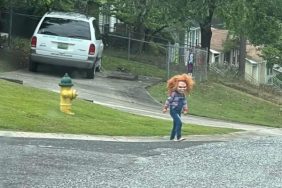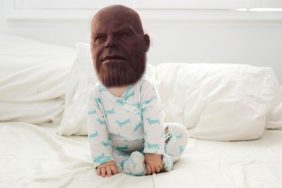
CraveOnline: Did you also follow the rule of not showing the creatures too much?
Corin Hardy: That’s a huge part of horror, I think, and good horror. It’s a really important balance for me to restrain and limit what you can see and hear, but also wanted the satisfying payoff as a fan of this stuff to go the extra mile, and despite our tight budget to hopefully see these things and get a kick out of what’s actually there.
Is it mostly creature makeup, or are there some visual effects too?
Everything was practical to begin with. There was five creature body suits, two animatronic heads, animatronic babies, changeling, animatronic arms. There was a fully articulated foam rubber model. We have prosthetic makeup transformation in stages. Everything was done for real and then we augmented specific moments like the finger extension to the eye.
With the creatures, I love the old fashioned effects. I love man in a suit but now we have got the ability to use visual effects and CG to augment and change the form slightly, reduce the width of arms. We built these external limbs that were too thin for a human to be able to walk on, so they were attached to the wrist and the shoulder blade and we’d paint out the human arm. Trying to look for ways you can create an unnerving form that we humans find there’s something off about, therefore it’s scary. If it’s full CG monster and you just don’t have an attachment to it, you can’t be scared of it. There’s been a great reaction, people finding it scary and intense.
I think a lot of that comes back to not showing too much but having real things there that you can light in camera and then reduce the amount of light that you actually throw on them. You’re sort of painting with light and you’re just trying to show the bits that are scary, and it’s difficult because we also show a full horde in this film. I wrote the scenes in a way everything has a light source that has the ability to fail or flicker or keep your eyeball moving on the screen.
These are all techniques I want every filmmaker to know. Did you learn it from studying or just being a fan?
Being a nerd. I mean, I didn’t do film school. I never studied it, but when you watch your favorite films, you realize why certain things are done certain ways and you look for ways you can involve them and take a fresh approach to them. A good example, if you watch something like Ridley Scott’s Alien, still one of my favorite films of all time, and the quality of performance, creatures, cinematography, atmosphere, sound, score, it’s all top notch. And the way the creature in Alien, the Giger design, there’s always a light or smoke, but there’s always something in the way. There’s always something moving. The same in Blade Runner as well.
You note that down to think, “How can I?” I knew I didn’t want to show the creatures too clearly but then I don’t like it when you get a film where they didn’t have enough so they just shake the camera around. You get frustrated so I wanted to be bold with the moments we did show and keep an energy with the moments in between, so there’s torch light, there’s car headlights, there’s flaming scythe light. I love iconic imagery. You look at Ash with his chainsaw, Sigourney with her flame thrower.
It’s like, what can we do that hasn’t really been done and that feels organic and fable like for a fairy tale? I wanted him to go into the last scenes somehow carrying a light source and I didn’t want an electronic torch because we’ve done this. I had this idea of a scythe and by that point he knows what he needs to do.
Do you think that might be the poster when they sell The Hallow?
I wouldn’t mind it to be. I’ve been sketching.








